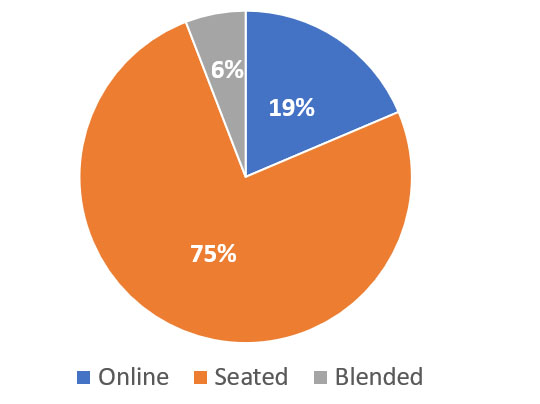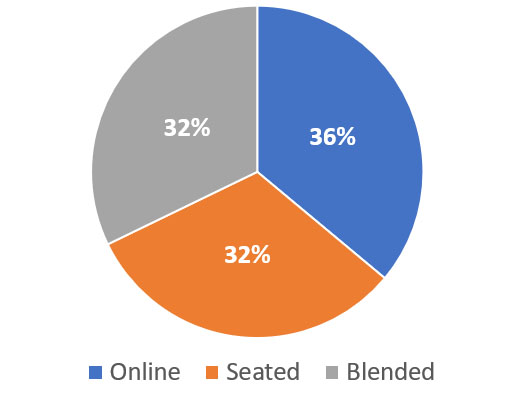We track delivery modalities for classes in three categories: seated, online and blended.
In fall 2019, our classes were distributed as follows:

In response to the pandemic, we modified our classes significantly before starting this semester. At the beginning of the fall 2020 semester, our classes were distributed as follows:

As the number of COVID-19 cases on campus has risen, we continue to adjust the way our classes are delivered. Since the beginning of the semester, we changed more than 30 additional classes to online or blended delivery for the remainder of the semester. We also moved more than 80 classes online or to Zoom temporarily to work through specific COVID-related issues impacting the class. Simultaneous Zoom delivery has also been implemented in numerous classes to allow students to keep up with their course work while in quarantine or isolation.
We continue to meet with the Springfield Greene County Health Department and other health authorities, monitor the impact of COVID-19 on our campus community and adjust our classes and operations as necessary.
Title IX changes
Title IX of the Education Amendments of 1972 protects students, faculty and staff from discrimination on the basis of sex. This law forms the backbone of higher education policy on sexual harassment and sexual assault.
In November 2018, the U.S. Department of Education (DOE) released new proposed Title IX regulations. We submitted a written comment articulating our concerns as part of the formal rule-making process. DOE received more than 124,000 comments on the proposed regulations.
In May 2020, DOE issued its final regulations along with more than 2,000 pages explaining the new requirements. Examples of significant changes to the law include:
- Changes the circumstances under which a university has “actual knowledge” of sexual harassment.
- Requires only that universities respond to sexual harassment in a way that is not “deliberately indifferent.”
- Changes the definition of sexual harassment.
- Curtails jurisdictional requirements, making Title IX apply in fewer situations. Situations not falling within the new Title IX jurisdictional requirements may be dealt with by other university processes.
- Requires that parties in Title IX hearings be entitled to an adviser of their choosing.
- Requires that direct and cross examination of parties and witnesses be conducted by the advisers.
- Requires specific written notice throughout Title IX proceedings that includes language about the presumption of innocence.
- Requires universities to establish an electronic database that contains all evidence in an investigation and provide both parties with full access to the database.
- Prohibits universities from limiting evidence from the database based on relevance.
- Prohibits Title IX investigators from making responsibility determinations.
- Requires that responsibility be determined through a live hearing with an opportunity to appeal.
- Requires that faculty and staff Title IX proceedings be conducted the same way that student proceedings are conducted.
Revised policies, regulations
Some of these changes are controversial, and we recognize the concerns expressed by many of our students, faculty and staff. Many members of the board and our leadership team share these concerns.
However, we must comply with the new law. To do this, the university has revised three policies to implement the new regulations:
- G 1.31 Discrimination on the Basis of a Protected Class
- 02-2 Discrimination Complaint and Investigation Procedure Policy
- 1.02-11 Title IX Sexual Harassment Grievance Procedure Policy
Relevant handbooks and the Code of Student Rights and Responsibilities have also been revised.
Taken together, these revisions ensure that the university will continue to investigate all sexual harassment complaints that it receives — regardless as to whether the complaint meets the new, more restrictive Title IX criteria, or is instead subject to Title VII or another university policy.
Seek help
Sexual harassment and assault are strictly prohibited at Missouri State. If you or someone you know has been sexually harassed or assaulted, please reach out to the Title IX office and make a complaint. We have resources in place to get you help and protection.
Thanks for all you do for Missouri State!







 Title IX coordinator committed to preventing, investigating sexual assaults
Title IX coordinator committed to preventing, investigating sexual assaults Education, awareness increase reporting
Education, awareness increase reporting Campus community called on to help
Campus community called on to help